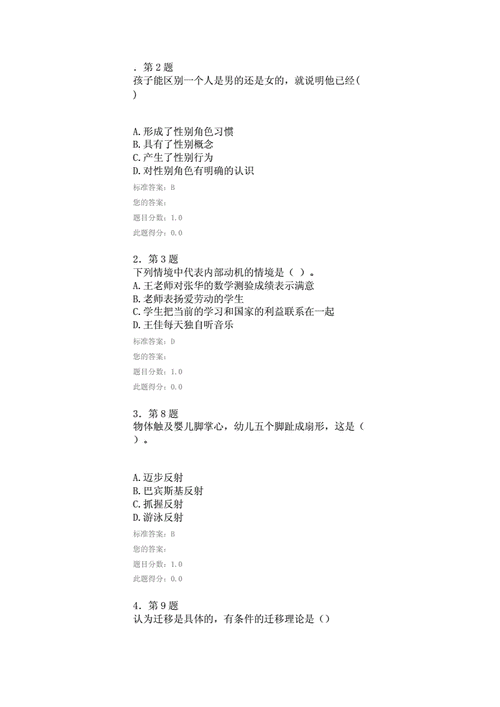学前教育心理学多选题及答案
教育心理学多选题
Question 1: Which of the following statements is true about cognitive development according to Piaget's theory?
- Children pass through four stages of development: sensorimotor, preoperational, concrete operational, and formal operational.
- Development is primarily influenced by social interactions.
- Children learn by observing others and imitating their behaviors.
- Development is continuous and occurs gradually over time.
Question 2: What is the main focus of behaviorism in education psychology?
- Understanding how cognitive processes influence learning.
- Exploring the role of emotions in learning.
- Studying how the environment shapes behavior through reinforcement and punishment.
- Analyzing the impact of genetics on intelligence.
Question 3: How does Vygotsky's sociocultural theory differ from Piaget's theory of cognitive development?

- Vygotsky emphasizes the role of social interactions and cultural tools in cognitive development, while Piaget focuses on individual exploration and discovery.
- Vygotsky's theory suggests that development occurs in stages, while Piaget's theory proposes that development is continuous.
- Vygotsky's theory highlights the importance of genetic factors in intelligence, while Piaget's theory emphasizes environmental influences.
- Vygotsky's theory focuses on the impact of emotions on learning, while Piaget's theory does not address emotional development.
Question 4: How can teachers apply principles of social learning theory in the classroom?
- Encourage students to work independently to develop problem-solving skills.
- Provide opportunities for peer collaboration and group work to promote social learning.
- Use punishment as the primary method of behavior modification.
- Focus solely on individual achievement and competition among students.
Question 5: What is the significance of motivation in learning according to self-determination theory?
- External rewards are the most effective way to motivate students.
- Students are intrinsically motivated when they have a sense of autonomy, competence, and relatedness.
- Students should be motivated through fear of failure and punishment.
- Teachers should not consider students' individual needs and interests when motivating them.
